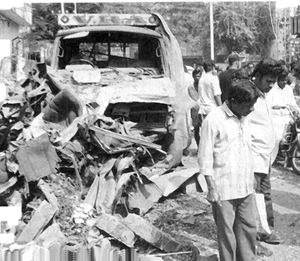1998 Coimbatore bombings
 1998 Coimbatore bombings were a series of bomb explosions that occurred on 14 February 1998 in the city of Coimbatore, Tamil Nadu, India. The attacks left 58 people dead and over 200 injured. The bombings were intended to disrupt the electoral process and target the Hindu nationalist leader L.K. Advani, who was campaigning for the Bharatiya Janata Party (BJP) in the upcoming national elections. The main accused in the bombings were members of the radical Islamist group Al Ummah, which was based in Tamil Nadu.
1998 Coimbatore bombings were a series of bomb explosions that occurred on 14 February 1998 in the city of Coimbatore, Tamil Nadu, India. The attacks left 58 people dead and over 200 injured. The bombings were intended to disrupt the electoral process and target the Hindu nationalist leader L.K. Advani, who was campaigning for the Bharatiya Janata Party (BJP) in the upcoming national elections. The main accused in the bombings were members of the radical Islamist group Al Ummah, which was based in Tamil Nadu.
Background[edit | edit source]
The city of Coimbatore had been experiencing a period of religious tension between Hindu and Muslim communities leading up to the bombings. The immediate trigger was the killing of a police constable by suspected Muslim extremists, which was followed by the retaliatory killing of a Muslim youth. This led to a cycle of violence, culminating in the 1998 bombings.
The Bombings[edit | edit source]
On the day of the bombings, a series of 12 bombs exploded in 11 locations across Coimbatore within a span of a few hours. The targets included the RSS office, a Hindu nationalist organization; a local branch of the BJP; and a crowded market area. The most devastating of these was the bomb that exploded near the venue where L.K. Advani was scheduled to speak. Advani's visit was delayed, and he was not present at the time of the explosion, narrowly escaping harm.
Aftermath[edit | edit source]
The bombings led to a heightened sense of insecurity among the residents of Coimbatore and intensified the communal tensions in the region. In the immediate aftermath, the city was placed under a high security alert, and extensive investigations were launched to apprehend those responsible.
Investigation and Arrests[edit | edit source]
The investigation into the bombings was conducted by the Tamil Nadu police, with assistance from various central agencies. It led to the arrest of over 160 individuals associated with Al Ummah. The leader of Al Ummah, S.A. Basha, was among those arrested and was accused of masterminding the attacks. The investigations revealed that the bombings were planned over several months and were intended to create communal discord and disrupt the electoral process.
Trial and Conviction[edit | edit source]
The trial of the accused was conducted in a special court set up under the provisions of the Terrorist and Disruptive Activities (Prevention) Act (TADA). In 2007, the court convicted 70 individuals and acquitted 11 due to lack of evidence. The convicted individuals received various sentences, including life imprisonment and death sentences for the key accused.
Impact[edit | edit source]
The 1998 Coimbatore bombings had a significant impact on the political and social fabric of Tamil Nadu. It led to increased security measures and a crackdown on extremist groups in the state. The bombings also influenced the national elections, with the BJP and its allies highlighting the issue of national security in their campaigns.
Legacy[edit | edit source]
The bombings are remembered as one of the deadliest terrorist attacks in India during the 1990s. They underscored the challenges of communalism and terrorism in the country and the need for vigilance and cooperation between different communities and law enforcement agencies to prevent such tragedies in the future.
Search WikiMD
Ad.Tired of being Overweight? Try W8MD's physician weight loss program.
Semaglutide (Ozempic / Wegovy and Tirzepatide (Mounjaro / Zepbound) available.
Advertise on WikiMD
|
WikiMD's Wellness Encyclopedia |
| Let Food Be Thy Medicine Medicine Thy Food - Hippocrates |
Translate this page: - East Asian
中文,
日本,
한국어,
South Asian
हिन्दी,
தமிழ்,
తెలుగు,
Urdu,
ಕನ್ನಡ,
Southeast Asian
Indonesian,
Vietnamese,
Thai,
မြန်မာဘာသာ,
বাংলা
European
español,
Deutsch,
français,
Greek,
português do Brasil,
polski,
română,
русский,
Nederlands,
norsk,
svenska,
suomi,
Italian
Middle Eastern & African
عربى,
Turkish,
Persian,
Hebrew,
Afrikaans,
isiZulu,
Kiswahili,
Other
Bulgarian,
Hungarian,
Czech,
Swedish,
മലയാളം,
मराठी,
ਪੰਜਾਬੀ,
ગુજરાતી,
Portuguese,
Ukrainian
Medical Disclaimer: WikiMD is not a substitute for professional medical advice. The information on WikiMD is provided as an information resource only, may be incorrect, outdated or misleading, and is not to be used or relied on for any diagnostic or treatment purposes. Please consult your health care provider before making any healthcare decisions or for guidance about a specific medical condition. WikiMD expressly disclaims responsibility, and shall have no liability, for any damages, loss, injury, or liability whatsoever suffered as a result of your reliance on the information contained in this site. By visiting this site you agree to the foregoing terms and conditions, which may from time to time be changed or supplemented by WikiMD. If you do not agree to the foregoing terms and conditions, you should not enter or use this site. See full disclaimer.
Credits:Most images are courtesy of Wikimedia commons, and templates Wikipedia, licensed under CC BY SA or similar.
Contributors: Prab R. Tumpati, MD
